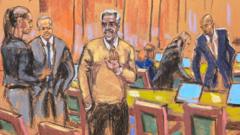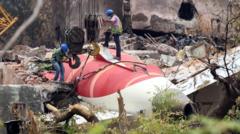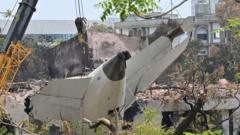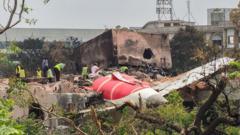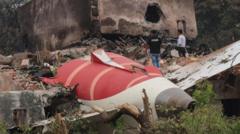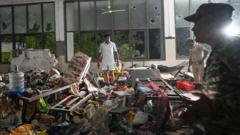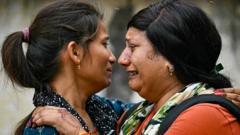Victims of clergy abuse are left questioning whether Pope Francis did enough during his papacy to address the rampant issue of child exploitation within the Catholic Church. For many survivors, while acknowledging some reforms, the perceived lack of comprehensive action remains painfully apparent.
Pope Francis' Legacy Under Fire as Abuse Survivors Call for Action

Pope Francis' Legacy Under Fire as Abuse Survivors Call for Action
As cardinals convene in Rome, the legacy of Pope Francis regarding clergy sexual abuse is under intense scrutiny from victims seeking greater accountability.
The handling of child abuse by the Catholic Church, particularly under Pope Francis, remains a contentious issue as the institution seeks a new leader. Survivors argue that despite some progress, significant gaps persist in ensuring accountability and transparency for past abuses.
The article text:
As 135 cardinals gather in Rome to deliberate the next pope, a critical aspect of Pope Francis' legacy looms large—his response to the sexual abuse scandal that has marred the Catholic Church. Though he is noted for acknowledging victims and reforming internal policies, many abuse survivors contend that his actions fell short of what was necessary.
Victims like Alexa MacPherson, who endured sexual abuse from the age of three at the hands of priest Peter Kanchong, express profound disappointment. “When I was nine-and-a-half, my father caught him trying to rape me on the living room couch,” she recounted during an interview in Boston. After her father notified the authorities, the church moved quickly to assert its influence, believing the court proceedings would protect Kanchong rather than the victim.
The fallout from previous scandals has led to a lingering sentiment of injustice, with many survivors feeling that Pope Francis did not address these issues adequately during his tenure. MacPherson's case, along with others, highlights the systemic failures of the Church dating back to the time before Francis became pope. Recent scandals exacerbated existing frustrations among survivors, some of whom remain skeptical about the Church’s commitment to real reform.
In 1984, Archbishop Bernard Law wrote to a bishop in Thailand regarding Kanchong, acknowledging the “grave scandal” it would cause if he were to remain in the U.S. due to the allegations against him. Instead of facing consequences, Kanchong received probation and ultimately worked elsewhere in Boston, all while the Church sought to protect its image.
Many believe the Church's reforms under Francis have been insufficient. The Pope did call for an assembly of bishops in 2019 to address the abuse crisis, yet survivors like MacPherson assert that the changes made were not comprehensive enough to prevent future abuses or ensure accountability for past actions. “We have to litigate in court to get documents, nothing really has changed,” said Mitchell Garabedian, a prominent attorney for survivors.
Despite acknowledging that some steps were taken, MacPherson insists that there remains a lack of transparency and accountability within the Church. She seeks a full disclosure of information on predatory priests and those who protected them, calling for accountability that extends beyond internal mechanisms to the broader legal system.
With the Vatican preparing for its next leadership, hopes for transformative change remain low among survivors of abuse. “You say you want to move forward. You say you want to bring people back into the fold,” MacPherson noted, “But you cannot do any of that until you truly acknowledge those sins, and you hold those people accountable.”
As media coverage surrounding the pope’s death and the election of a new leader continues, MacPherson reflects on the persistent pain and helplessness felt by survivors, struggling against the backdrop of the Church's ongoing commitment to secrecy surrounding these grave issues.
The article text:
As 135 cardinals gather in Rome to deliberate the next pope, a critical aspect of Pope Francis' legacy looms large—his response to the sexual abuse scandal that has marred the Catholic Church. Though he is noted for acknowledging victims and reforming internal policies, many abuse survivors contend that his actions fell short of what was necessary.
Victims like Alexa MacPherson, who endured sexual abuse from the age of three at the hands of priest Peter Kanchong, express profound disappointment. “When I was nine-and-a-half, my father caught him trying to rape me on the living room couch,” she recounted during an interview in Boston. After her father notified the authorities, the church moved quickly to assert its influence, believing the court proceedings would protect Kanchong rather than the victim.
The fallout from previous scandals has led to a lingering sentiment of injustice, with many survivors feeling that Pope Francis did not address these issues adequately during his tenure. MacPherson's case, along with others, highlights the systemic failures of the Church dating back to the time before Francis became pope. Recent scandals exacerbated existing frustrations among survivors, some of whom remain skeptical about the Church’s commitment to real reform.
In 1984, Archbishop Bernard Law wrote to a bishop in Thailand regarding Kanchong, acknowledging the “grave scandal” it would cause if he were to remain in the U.S. due to the allegations against him. Instead of facing consequences, Kanchong received probation and ultimately worked elsewhere in Boston, all while the Church sought to protect its image.
Many believe the Church's reforms under Francis have been insufficient. The Pope did call for an assembly of bishops in 2019 to address the abuse crisis, yet survivors like MacPherson assert that the changes made were not comprehensive enough to prevent future abuses or ensure accountability for past actions. “We have to litigate in court to get documents, nothing really has changed,” said Mitchell Garabedian, a prominent attorney for survivors.
Despite acknowledging that some steps were taken, MacPherson insists that there remains a lack of transparency and accountability within the Church. She seeks a full disclosure of information on predatory priests and those who protected them, calling for accountability that extends beyond internal mechanisms to the broader legal system.
With the Vatican preparing for its next leadership, hopes for transformative change remain low among survivors of abuse. “You say you want to move forward. You say you want to bring people back into the fold,” MacPherson noted, “But you cannot do any of that until you truly acknowledge those sins, and you hold those people accountable.”
As media coverage surrounding the pope’s death and the election of a new leader continues, MacPherson reflects on the persistent pain and helplessness felt by survivors, struggling against the backdrop of the Church's ongoing commitment to secrecy surrounding these grave issues.

